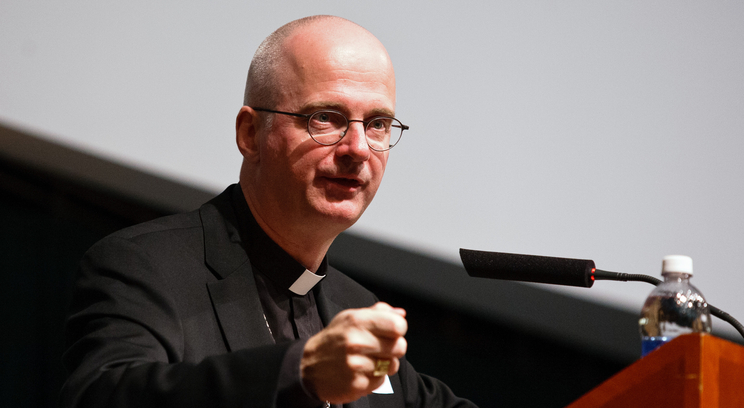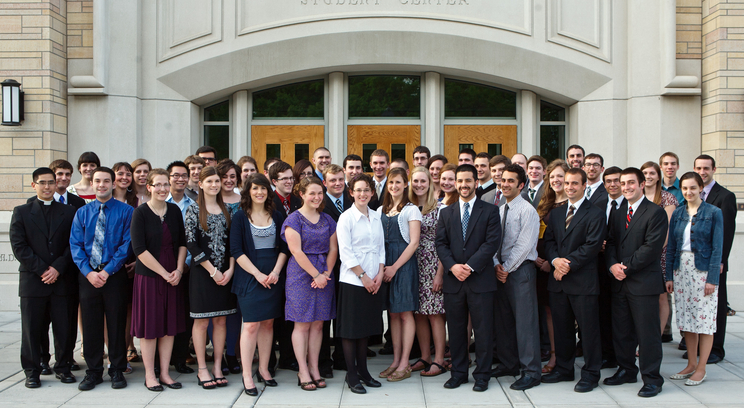The integration of law and the Catholic intellectual tradition was the vision of Monsignor Terrence J. Murphy, president and chancellor of the University of St. Thomas for more than 35 years. In his book, A Catholic University, Vision and Opportunities, he emphasized the importance of teaching religious and ethical values in classrooms and in public forums as necessary for a healthy society and effective leadership. “For too long religion has been ignored and relegated solely to the private lives of people: their moral convictions were to be left at home and not influence their lives on the job, in community endeavors, or in their relationships with other people; merely ‘private feeling’ should not be brought into classroom instruction. Such a philosophy impoverishes people’s lives and undermines the health of society. For this reason, the conviction that religion should enter the marketplace and public forum became a guiding star that set the direction on the university,” he wrote.
For the last two years, the Murphy Institute for Catholic Thought, Law and Public Policy has supported a monthly public speaker series at the School of Law that reflects Murphy’s vision: Hot Topics/Cool Talk. The format of the series surveys both the Catholic position and a challenging perspective on major policy issues likely to be the focus of debate. Past topics included stem-cell research, immigration, marriage, health care and budget oversight. The opening lecture this year focused on religious liberty: The Most Rev. Charles Morerod, O.P., bishop of Lausane, Geneva and Fribourg, Switzerland, offered a European perspective while his fellow Dominican, Father Reggie Whitt, provided the American viewpoint. Both Dominicans argued that the Vatican II document, Declaration on Religious Freedom, Dignitatis Humanae was important, but European nations and the United States received it in different ways. The idea of religious freedom was far more provocative in the European nations; while the United States was founded on the philosophy of religious freedom, European nations, with a history of religious tension and violence, believed that true religious freedom would lead to social and political unrest. Father Whitt presented the reception of Dignitatis Humanae as an ignored or abandoned document. In the late 1960s, the United States began to see a creeping secularism in laws regarding morality and ethical behavior. Yet most Catholics accepted these laws, contrary to Church teachings, citing personal conscience under the guise of religious freedom as outlined in the Vatican II document.
Bishop Morerod’s evening lecture, “Vatican II’s Declaration on Religious Freedom: The View from Europe,” expanded on his earlier remarks. Morerod remarked that Dignitatis Humanae was a watershed document. “In the European countries, unity in society was equal to unity in religion. If you live in one country, you have that country’s religion. There is this idea of a state church, and very little notion of religious freedom.” The history of Europe includes long periods of religious violence, it is true, yet Morerod insists that Dignitatis Humanae is rooted in the dignity of the human person and that violence is not a natural response to religious freedom. “Look at the gospels, and look at Jesus Christ. He doesn’t oblige people to believe in his message; he presents it for them to decide.” Intolerance for Christian ideals is on the rise in Europe, including laws that ban religious symbols, dismiss conscientious objection for medical personnel, and forbid the discussion of faith in academic settings. “Christianity is still the enemy of society. Why? Recent notions have marginalized faith to the private sector thus excluding religion from public life and politics. This situation leads to problems” as Christians are members of both social and political life. Catholic Studies alumnus Michael Truso believes that “Bishop Morerod’s remarks were thought-provoking and illuminating to the American mind. He made it clear that many Europeans of many different faiths recognize the increase in harassment toward Christians in Europe. Yet I left the event feeling optimistic, encouraged by his zeal for creative solutions to promote ecumenism and his conviction in the Gospel message.”
Bishop Morerod is well known to Catholic Studies. He served as rector of the Pontifical University of St. Thomas Aquinas (Angelicum), professor of dogmatic theology and Secretary General of the International Theological Commission. He is fondly remembered by students who studied in Rome, as he was a frequent visitor to the Bernardi Residence. Monica Stiles, Bernardi resident during the spring of 2011, recalls, “Bishop Morerod (known better to me as Father and rector of the Angelicum) first captured my heart when I shared with the colorful Swiss Dominican that I longed for a particular candy found only in the United States. Lo and behold, upon his return from a trip to the States he brought back not one, but two bags of said candy. Since then, our friendship has grown, and it has been a great joy to have him as part of the fold of my Bernardi Rome family.”
It is a tradition of the Rome students to host a potluck in the Sitzmann Hall backyard when Morerod comes to visit, and September was no exception. More than 30 students gathered to pray, share dinner and socialize in what has come to be an annual event. Alessandro Marchetti, organizer of the event, sees this as another example of universality within the Catholic Studies community. “It’s such a tremendous opportunity to be able to spend time again with Bishop Morerod, who is for many of us a friend, professor and Father. It is a sign of tremendous universality when students from Catholic Studies in Saint Paul, Minn., can be at a reunion with a Swiss Bishop we met in Rome.”
As the university embarks on a search for a new president, it is also hosting a series of events that engages the theme of Catholic mission and identity. Catholic Studies and a variety of other campus programs sponsored a lecture by Father James Burns on this topic. In his lecture, “Creating a Dynamic Vision of Catholic Mission and Identity,” Burns critiqued higher education in general yet offered hope for reform through Catholic universities. He noted that studies of the perceived value of higher education found that graduates lacked certain character qualities, such as the ability to work well with others. “Interestingly, Catholic colleges and universities stand in a unique place to address this concern,” he said. “Through their religious heritage and spiritual traditions, these institutions are called to cultivate such important qualities through a focus on character development in their students; however, the influence of such a mission will only be fully appreciated if faculty can stand as exemplars of the character they hope to help their students develop.” For Burns, formation of character is an essential task of the Catholic university, one not to be replaced by mere instruction.
To watch video of Bishop Charles Morerod and Father Reggie Whitt or a video of Bishop Morerod’s evening lecture, visit the Murphy Institute’s website at www.stthomas.edu/murphyinstitute and click on Past Events.
Read more from Perspectives.







